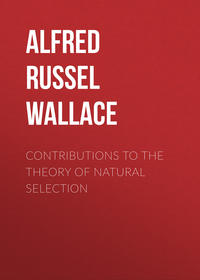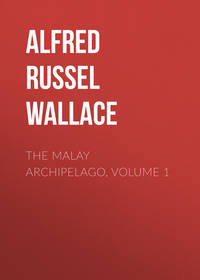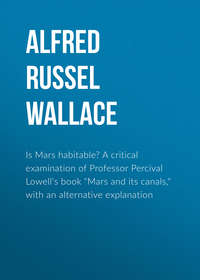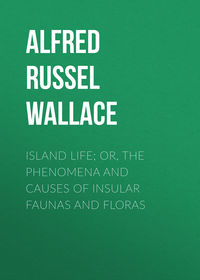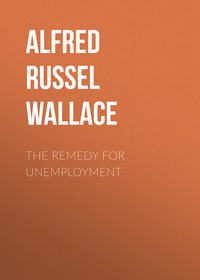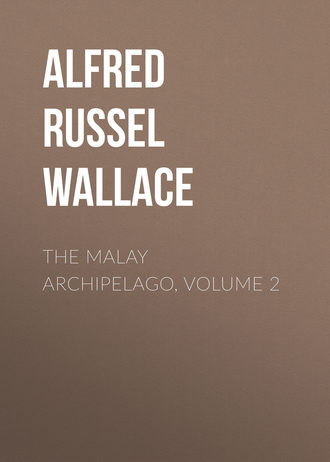 полная версия
полная версияThe Malay Archipelago, Volume 2
On arriving at Manowolko, we found the Rajah was at the opposite island of Goram; but he was immediately sent for, and in the meantime a large shed was given for our accommodation. At night the Rajah came, and the next day I had a visit from him, and found, as I expected, that I had already made his acquaintance three years before at Aru. He was very friendly, and we had a long talk; but when I begged for a boat and men to take me on to Ke, he made a host of difficulties. There were no praus, as all had gone to Ke or Aim; and even if one were found, there were no men, as it was the season when all were away trading. But he promised to see about it, and I was obliged to wait. For the next two or three days there was more talking and more difficulties were raised, and I had time to make an examination of the island and the people.
Manowolko is about fifteen miles long, and is a mere; upraised coral-reef. Two or three hundred yards inland rise cliffs of coral rock, in many parts perpendicular, and one or two hundred feet high; and this, I was informed, is characteristic of the whole island, in which there is no other kind of rock, and no stream of water. A few cracks and chasms furnish paths to the top of these cliffs, where there is an open undulating country, in which the chief vegetable grounds of the inhabitants are situated.
The people here—at least the chief men—were of a much purer Malay race than the Mahometans of the mainland of Ceram, which is perhaps due to there having been no indigenes on these small islands when the first settlers arrived. In Ceram, the Alfuros of Papuan race are the predominant type, the Malay physiognomy being seldom well marked; whereas here the reverse is the case, and a slight infusion of Papuan on a mixture of Malay and Bugis has produced a very good-looking set of people. The lower class of the population consist almost entirely of the indigenes of the adjacent island. They are a fine race, with strongly-marked Papuan features, frizzly hair, and brown complexions. The Goram language is spoken also at the east end of Ceram, and in the adjacent islands. It has a general resemblance to the languages of Ceram, but possesses a peculiar element which I have not met with in other languages of the Archipelago.
After great delay, considering the importance of every day at this time of year, a miserable boat and five men were found, and with some difficulty I stowed away in it such baggage as it was absolutely necessary for me to take, leaving scarcely sitting or sleeping room. The sailing qualities of the boat were highly vaunted, and I was assured that at this season a small one was much more likely to succeed in making the journey. We first coasted along the island, reaching its eastern extremity the following morning (April 11th), and found a strong W. S.W. wind blowing, which just allowed us to lay across to the Matabello Islands, a distance little short of twenty miles. I did not much like the look of the heavy sky and rather rough sea, and my men were very unwilling to make the attempt; but as we could scarcely hope for a better chance, I insisted upon trying. The pitching and jerking of our little boat, soon reduced me to a state of miserable helplessness, and I lay down, resigned to whatever might happen. After three or four hours, I was told we were nearly over; but when I got up, two hours later, just as the sun was setting, I found we were still a good distance from the point, owing to a strong current which had been for some time against us. Night closed in, and the wind drew more ahead, so we had to take in sail. Then came a calm, and we rowed and sailed as occasion offered; and it was four in the morning when we reached the village of Kisslwoi, not having made more than three miles in the last twelve hours.
MATABELLO ISLANDSAt daylight I found we were; in a beautiful little harbour, formed by a coral reef about two hundred yards from shore, and perfectly secure in every wind. Having eaten nothing since the previous morning, we cooked our breakfast comfortably on shore, and left about noon, coasting along the two islands of this group, which lie in the same line, and are separated by a narrow channel. Both seem entirely formed of raised coral rock; but them has been a subsequent subsidence, as shaven by the barrier reef which extends all along them at varying distances from the shore, This reef is sometimes only marked by a. line of breakers when there is a little swell on the sea; in other places there is a ridge of dead coral above the water, which is here and there high enough to support a few low bushes. This was the first example I had met with of a true barrier reef due to subsidence, as has been so clearly shown by Mr. Darwin. In a sheltered archipelago they will seldom be distinguishable, from the absence of those huge rolling waves and breakers which in the wide ocean throw up a barrier of broken coral far above the usual high-water mark, while here they rarely rise to the surface.
On reaching the end of the southern island, called Uta, we were kept waiting two days for a wind that would enable us to pass over to the next island, Teor, and I began to despair of ever reaching Ke, and determined on returning. We left with a south wind, which suddenly changed to north-east, and induced me to turn again southward in the hopes that this was the commencement of a few days' favourable weather. We sailed on very well in the direction of Teor for about an hour, after which the wind shifted to WSW., and we were driven much out of our course, and at nightfall found ourselves in the open sea, and full ten miles to leeward of our destination. My men were now all very much frightened, for if we went on we might be a. week at sea in our little open boat, laden almost to the water's edge; or we might drift on to the coast of New Guinea, in which case we should most likely all be murdered. I could not deny these probabilities, and although I showed them that we could not get back to our starting-point with the wind as it was, they insisted upon returning. We accordingly put about, and found that we could lay no nearer to Uta than to Teor; however, by great good luck, about ten o'clock we hit upon a little coral island, and lay under its lee till morning, when a favourable change of wind brought us back to Uta, and by evening (April 18th) we reached our first anchorage in Matabello, where I resolved to stay a few days, and then return to Goram. It way with much regret that I gave up my trip to Ke and the intervening islands, which I had looked forward to as likely to make up for my disappointment in Ceram, since my short visit on my voyage to Aru had produced me so many rare and beautiful insects.
The natives of Matabello are almost entirely occupied in making cocoanut oil, which they sell to the Bugis and Goram traders, who carry it to Banda and Amboyna. The rugged coral rock seems very favourable to the growth of the cocoa-nut palm, which abounds over the whole island to the very highest points, and produces fruit all the year round. Along with it are great numbers of the areca or betel-nut palm, the nuts of which are sliced, dried, and ground into a paste, which is much used by the betel-chewing Malays and Papuans. All the little children here even such as can just run alone, carried between their lips a mass of the nasty-looking red paste, which is even more disgusting than to see them at the same age smoking cigars, which is very common even before they are weaned. Cocoa-nuts, sweet potatoes, an occasional sago cake, and the refuse nut after the oil has been extracted by boiling, form the chief sustenance of these people; and the effect of this poor and unwholesome diet is seen in the frequency of eruptions and scurfy skin diseases, and the numerous sores that disfigure the faces of the children.
The villages are situated on high and rugged coral peaks, only accessible by steep narrow paths, with ladders and bridges over yawning chasms. They are filthy with rotten husks and oil refuse, and the huts are dark, greasy, and dirty in the extreme. The people are wretched ugly dirty savages, clothed in unchanged rags, and living in the most miserable manner, and as every drop of fresh water has to be brought up from the beach, washing is never thought of; yet they are actually wealthy, and have the means of purchasing all the necessaries and luxuries of life. Fowls are abundant, and eggs were given me whenever I visited the villages, but these are never eaten, being looked upon as pets or as merchandise. Almost all of the women wear massive gold earrings, and in every village there are dozens of small bronze cannon lying about on the ground, although they have cost on the average perhaps £10 a piece. The chief men of each village came to visit me, clothed in robes of silk and flowered satin, though their houses and their daily fare are no better than those of the ether inhabitants. What a contrast between these people and such savages as the best tribes of bill. Dyaks in Borneo, or the Indians of the Uaupes in South America, living on the banks of clear streams, clean in their persons and their houses, with abundance of wholesome food, and exhibiting its effect in healthy shins and beauty of form and feature! There is in fact almost as much difference: between the various races of savage as of civilized peoples, and we may safely affirm that the better specimens of the former are much superior to the lower examples of the latter class.
One of the few luxuries of Matabello is the palm wine; which is the fermented sap from the flower stains of the cocoa-net. It is really a very mice drink, more like cyder than beer, though quite as intoxicating as the latter. Young cocoa-nuts are also very abundant, so that anywhere in the island it is only necessary to go a few yards to find a delicious beverage by climbing up a tree for it. It is the water of the young fruit that is drunk, before the pulp has hardened; it is then more abundant, clear, and refreshing, and the thin coating of gelatinous pulp is thought a treat luxury. The water of full-brown cocoa-nuts is always thrown away as undrinkable, although it is delicious in comparison with that of the old dry nuts which alone we obtain in this country. The cocoa-nut pulp I did not like at first; but fruits are so scarce, except at particular seasons, that one soon learns to appreciate anything of a fruity nature.
Many persons in Europe are under the impression that fruits of delicious flavour abound in the tropical forests, and they will no doubt be surprised to learn that the truly wild fruits of this brand and luxuriant archipelago, the vegetation of which will vie with that of any part of the world, are in almost every island inferior in abundance and duality to those of Britain. Wild strawberries and raspberries are found in some places, but they are such poor tasteless things as to be hardly worth eating, and there is nothing to compare with our blackberries and whortleberries. The kanary-nut may be considered equal to a hazel-nut, but I have met with nothing else superior to our crabs, oar haws, beech-nuts, wild plums, and acorns; fruits which would be highly esteemed by the natives of these islands, and would form an important part of their sustenance. All the fine tropical fruits are as much cultivated productions as our apples, peaches, and plums, and their wild prototypes, when found, are generally either tasteless or uneatable.
The people of Matabello, like those of most of the Mahometan villages of East Ceram and Goram, amused me much by their strange ideas concerning the Russian war. They believe that the Russians were not only most thoroughly beaten by the Turks, but were absolutely conquered, and all converted to Islamism! And they can hardly be convinced that such is not the case, and that had it not been for the assistance of France and England, the poor Sultan world have fared ill. Another of their motions is, that the Turks are the largest and strongest people in the world—in fact a race of giants; that they eat enormous quantities of meat, and are a most ferocious and irresistible nation. Whence such strangely incorrect opinions could have arisen it is difficult to understand, unless they are derived from Arab priests, or hadjis returned from Mecca, who may have heard of the ancient prowess of the Turkish armies when they made all Europe tremble, and suppose that their character and warlike capacity must be the same at the present time.
GORAMA steady south-east wind having set in, we returned to Manowolko on the 25th of April, and the day after crossed over to Ondor, the chief village of Goram.
Around this island extends, with few interruptions, an encircling coral reef about a quarter of a mile from the shore, visible as a stripe of pale green water, but only at very lowest ebb-tides showing any rock above the surface. There are several deep entrances through this reef, and inside it there is hood anchorage in all weathers. The land rises gradually to a moderate height, and numerous small streams descend on all sides. The mere existence of these streams would prove that the island was not entirely coralline, as in that case all the water would sink through the porous rock as it does at Manowolko and Matabello; but we have more positive proof in the pebbles and stones of their beds, which exhibit a variety of stratified crystalline rocks. About a hundred yards from the beach rises a wall of coral rock, ten or twenty feet high, above which is an undulating surface of rugged coral, which slopes downward towards the interior, and then after a slight ascent is bounded by a second wall of coral. Similar walls occur higher up, and coral is found on the highest part of the island.
This peculiar structure teaches us that before the coral was formed land existed in this spot; that this land sunk gradually beneath the waters, but with intervals of rest, during which encircling reef's were formed around it at different elevations; that it then rose to above its present elevation, and is now again sinking. We infer this, because encircling reefs are a proof of subsidence; and if the island were again elevated about a hundred feet, what is now the reef and the shallow sea within it would form a wall of coral rock, and an undulating coralline plain, exactly similar to those that still exist at various altitudes up to the summit of the island. We learn also that these changes have taken place at a comparatively recent epoch, for the surface of the coral has scarcely suffered from the action of the weather, and hundreds of sea-shells, exactly resembling those still found upon the beach, and many of them retaining their gloss and even their colour, are scattered over the surface of the island to near its summit.
Whether the Goram group formed originally part of New Guinea or of Ceram it is scarcely possible to determine, and its productions will throw little light upon the question, if, as I suppose, the islands have been entirely submerged within the epoch of existing species of animals, as in that case it must owe its present fauna and flora to recent immigration from surrounding lands; and with this view its poverty in species very well agrees. It possesses much in common with East Ceram, but at the same time has a good deal of resemblance to the Ke Islands and Banda. The fine pigeon, Carpophaga concinna, inhabits Ke, Banda, Il-Iatabello, and Goram, and is replaced by a distinct species, C. neglecta, in Ceram. The insects of these four islands have also a common facies—facts which seem to indicate that some more extensive land has recently disappeared from the area they now occupy, and has supplied them with a few of its peculiar productions.
The Goram people (among whom I stayed a month) are a race of traders. Every year they visit the Tenimber, Ke, and Aru Islands, the whole north-west coast of New Guinea from Oetanata to Salwatty, and the island of Waigiou and Mysol. They also extend their voyages to Tidore and Ternate, as well as to Banda and Amboyna, Their praus are all made by that wonderful race of boatbuilders, the Ke islanders, who annually turn out some hundreds of boats, large and small, which can hardly be surpassed for beauty of form and goodness of workmanship, They trade chiefly in tripang, the medicinal mussoi bark, wild nutmegs, and tortoiseshell, which they sell to the Bugis traders at Ceram-laut or Aru, few of them caring to take their products to any other market. In other respects they are a lazy race, living very poorly, and much given to opium smoking. The only native manufactures are sail-matting, coarse cotton cloth, and pandanus-leaf boxes, prettily stained and ornamented with shell-work.
In the island of Goram, only eight or ten miles long, there are about a dozen Rajahs, scarcely better off than the rest of the inhabitants, and exercising a mere nominal sway, except when any order is received from the Dutch Government, when, being backed by a higher power, they show a little more strict authority. My friend the Rajah of Ammer (commonly called Rajah of Goram) told me that a few years ago, before the Dutch had interfered in the affairs of the island, the trade was not carried on so peaceably as at present, rival praus often fighting when on the way to the same locality, or trafficking in the same village. Now such a thing is never thought of-one of the good effects of the superintendence of a civilized government. Disputes between villages are still, however, sometimes settled by fighting, and I one day saw about fifty men, carrying long guns and heavy cartridge-belts, march through the village. They had come from the other side of the island on some question of trespass or boundary, and were prepared for war if peaceable negotiations should fail.
While at Manowolko I had purchased for 100 florins (£9.) a small prau, which was brought over the next day, as I was informed it was more easy to have the necessary alterations made in Goram, where several Ke workmen were settled.
As soon as we began getting my prau ready I was obliged to give up collecting, as I found that unless I was constantly on the spot myself very little work would be clone. As I proposed making some long voyages in this boat, I determined to fit it up conveniently, and was obliged to do all the inside work myself, assisted by my two Amboynese boys. I had plenty of visitors, surprised to see a white man at work, and much astonished at the novel arrangements I was making in one of their native vessels. Luckily I had a few tools of my own, including a small saw and some chisels, and these were now severely tried, cutting and fitting heavy iron-wood planks for the flooring and the posts that support the triangular mast. Being of the best London make, they stood the work well, and without them it would have been impossible for me to have finished my boat with half the neatness, or in double the time. I had a Ke workman to put in new ribs, for which I bought nails of a Bugis trader, at 8d. a pound. My gimlets were, however, too small; and having no augers we were obliged to bore all the holes with hot irons, a most tedious and unsatisfactory operation.
Five men had engaged to work at the prau till finished, and then go with me to Mysol, Waigiou, and Ternate. Their ideas of work were, however, very different from mine, and I had immense difficulty with them; seldom more than two or three coming together, and a hundred excuses being given for working only half a day when they did come. Yet they were constantly begging advances of money, saying they had nothing to eat. When I gave it them they were sure to stay away the next day, and when I refused any further advances some of them declined working any more. As the boat approached completion my difficulties with the men increased. The uncle of one had commenced a war, or sort of faction fight, and wanted his assistance; another's wife was ill, and would not let him come; a third had fever and ague, and pains in his head and back; and a fourth had an inexorable creditor who would not let him go out of his sight. They had all received a month's wages in advance; and though the amount was not large, it was necessary to make them pay it back, or I should get any men at all. I therefore sent the village constable after two, and kept them in custody a day, when they returned about three-fourths of what they owed me. The sick man also paid, and the steersman found a substitute who was willing to take his debt, and receive only the balance of his wages.
About this time we had a striking proof of the dangers of New Guinea trading. Six men arrived at the village in a small boat almost starved, having escaped out of two praus, the remainder of whose crews (fourteen in number) had been murdered by the natives of New Guinea. The praus had left this village a few months before, and among the murdered men were the Rajah's son, and the relation or slaves of many of the inhabitants. The cry of lamentation that arose when the news arrived was most distressing. A score of women, who had lost husbands, brothers, sons, or more distant relatives, set up at once the most dismal shrieks and groans and wailings, which continued at intervals till late at night; and as the chief houses in the village were crowded together round that which I occupied, our situation was anything but agreeable.
It seems that the village where the attack took place (nearly opposite the small island of Lakahia) is known to be dangerous, and the vessels had only gone there a few days before to buy some tripang. The crew were living on shore, the praus being in a small river close by, and they were attacked and murdered in the day-time while bargaining with the Papuans. The six men who survived were on board the praus, and escaped by at once setting into the small boat and rowing out to sea.
This south-west part of New Guinea, known to the native traders as "Papua Kowiyee" and "Papua Onen," is inhabited by the most treacherous and bloodthirsty tribes. It is in these districts that the commanders and portions of the crews of many of the early discovery ships were murdered, and scarcely a year now passes but some lives are lost. The Goram and Ceram traders are themselves generally inoffensive; they are well acquainted with the character of these natives, and are not likely to provoke an attack by any insults or open attempt at robbery or imposition. They are accustomed to visit the same places every year, and the natives can have no fear of them, as may be alleged in excuse for their attacks on Europeans. In other extensive districts inhabited by the same Papuan races, such as Mysol, Salwatty, Waigiou, and some parts of the adjacent coast, the people have taken the first step in civilization, owing probably to the settlement of traders of mixed breed among them, and for many years no such attacks have taken place. On the south-west coast, and in the large island of Jobie, however, the natives are in a very barbarous condition, and tale every opportunity of robbery and murder,—a habit which is confirmed by the impunity they experience, owing to the vast extent of wild mountain and forest country forbidding all pursuit or attempt at punishment. In the very same village, four years before, more than fifty Goram men were murdered; and as these savages obtain an immense booty in the praus and all their appurtenances, it is to be feared that such attacks will continue to be made at intervals as long as traders visit the same spots and attempt no retaliation. Punishment could only be inflicted on these people by very arbitrary measures, such as by obtaining possession of some of the chiefs by stratagem, and rendering them responsible for the capture of the murderers at the peril of their own heads. But anything of this kind would be done contrary to the system adopted by the Dutch Government in its dealings with natives.
GORAM TO WAHAI IN CERAMWhen my boat was at length launched and loaded, I got my men together, and actually set sail the next day (May 27th), much to the astonishment of the Goram people, to whom such punctuality was a novelty. I had a crew of three men and a boy, besides my two Amboyna lads; which was sufficient for sailing, though rather too few if obliged to row much. The next day was very wet, with squalls, calms, and contrary winds, and with some difficulty we reached Kilwaru, the metropolis of the Bugis traders in the far East. As I wanted to make some purchases, I stayed here two days, and sent two of my boxes of specimens by a Macassar prau to be forwarded to Ternate, thus relieving myself of a considerable incumbrance. I bought knives, basins, and handkerchiefs for barter, which with the choppers, cloth, and beads I had brought with me, made a pretty good assortment. I also bought two tower muskets to satisfy my crew, who insisted on the necessity of being armed against attacks of pirates; and with spices and a few articles of food for the voyage nearly my last doit was expended.




